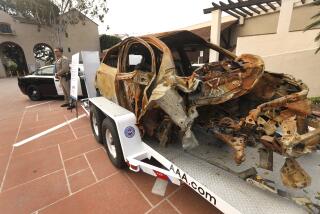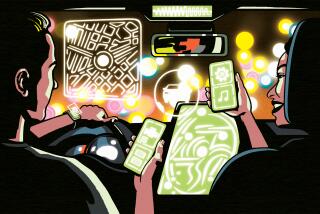Majority of U.S. drivers say GPS systems have led them astray
- Share via
Most American drivers say they’ve been burned more than once by their GPS navigation systems, according to a new survey commissioned by Michelin.
In the online survey of 2,200 drivers, 63% reported being taken off track an average of 4.4 times since starting to use global positioning systems. Younger adults between 18 and 34 said they’d been given wrong directions 6.3 times. An unfortunate 7% of motorists were misdirected more than 10 times.
The fallibility of GPS systems is “something that we all kind of think [is true]” said Tony Fouladpour, a Michelin North America spokesman, “but this actually quantifies it.”
The errors could result from out-of-date map data, said Phil Magney, an analyst at research firm IHS Automotive.
“That has been an industry problem for some time,” Magney said. “You could buy a new car today and the GPS data could easily be a year old. That’s how long it takes to get through the supply chain.”
The survey uncovered demographic differences among the 30% of U.S. adults who use the high-tech in-car systems. Men (35%) are more likely than women (26%) to use GPS.
Across the country, about 35% of drivers in the Northeast rely on GPS when in unfamiliar places compared to the 25% of drivers in the West who look to the systems as their guides.
Frustrating experiences with, or maybe general suspicion of the hit-or-miss systems seem to have led Americans to keep a backup method at the ready. About half of drivers still keep road maps and atlases in their cars. Those 55 and over were more likely to hold onto the old standby -- 57% -- compared with 44% of drivers 45-54, 39% of the 35-44 bracket, and 34% of the youngest set, 18-34.
Nineteen percent said they primarily used smartphones and tablets as travel aids; 65 rely on the kindness of strangers, asking locals for verbal directions; and 3% choose to wing it without any guidance at all when traveling in new places.
Magney said a little patience with the systems might be needed. “I couldn’t imagine a more complicated database to maintain .… I’ve heard stories about GPS maps leading people into walls, but I’ve yet to encounter anything strange like that. At the end of the day, the systems are getting better and better. I’m a fan.”
ALSO:
Google wants to show drivers the Waze
Garmin’s newest GPS helps you hit the road
Google aims to be your personal cartographer
Twitter: @c_s_green






